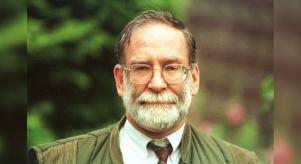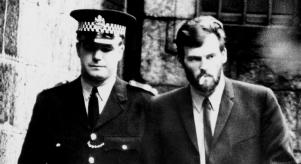
RedHanded podcast: interview
RedHanded is a True Crime podcast presented by British pals, Hannah and Suruthi, whose shared love of the genre led to them starting their own.
Now in its second year, the podcast has amassed aloyal following of True Crime nuts who download each weekly episode to hear, Hannah and Suruthi's idiosyncratic take on their featured cases.
According to the podcast blurb,'RedHanded the podcast jumps head first into all manner of macabre madness. We cover everything from big time serial killers (and those you may never have heard of), to hauntings, possessions, disturbing mysteries, bizarre whodunits and basically anything that tickles our creepy fancy. So, join us, plug in, sit back and prepare for scares.'
The focus of the podcast is on the societal and cultural issues raised by each case as well as the details about the crimes themselves. Apart from True Crime, a major draw for listeners is the rapport between the two presenters and the palpable enjoyment Suruthi and Hannah take in each other's company. It is often very funny, despite its dark subject matter.
Crime and Investigation called up Hannah and spoke to her about the world of True Crime podcasting and asked for her take on theShafilea Ahmed case, featured in episode 7 of When Missing Turns to Murder which they discusshere. You can listen to the full interview in episode 2 of Inside Crime+Investigationhere.
I was living with an American about 2 years ago and he had all of his family over for Thanksgiving and we had a Thanksgiving party at my flat.
Suruthi came along just because her friend was sleeping on my sofa at the time, so we're really not connected at all. She came to the Thanksgiving dinner and we drank a lot of wine and we ended up discussing JonBenét Ramsey in front of all the children and my flatmate's massive extended family. Two years ago it was quite rare to find someone listening to podcasts let alone someone who was listening to the exact same specific ones that you were listening to.
So half as a joke I said, let's just start a podcast and we did and then 2 years later, here we are.
When we were starting the podcast we were thinking of maybe just doing British cases or maybe focusing on a specific type of case but we really didn't want to limit ourselves. It would be my worse nightmare to come across a really interesting case but because it wasn't British we wouldn't be able to do it.
We won't do cases where we don't have anything to add to the conversation, like doing Jack the Ripper, or doingTed Bundy - what do we have to add to that? It's been done so many times. We tend to choose cases that are either less well-known or if they are well known we bring something new to the table.
We work on a weekly cycle with episodes coming out each Thursday, (Patreon supporters can download it a day early on Wednesday), so we record it at the weekend edit it. So really it has to be ready to go on Tuesday night.
We take it in turns, to research cases, so if it's my turn by Wednesday I really want to have a good idea of the case I'm going to do. My process is, I find everything I can on the case. I think it would be remiss to do a case having not watched, read/listened to as much as you can. If it's out there we'll find it. Then I copy and paste all the information into one big document and go through it. I take out the bits that repeat themselves and I like to let it sit overnight, so I can sleep on it. Then I pick out the key story points from there.
The episode I'm most proud of is Stephen Lawrence, just because hate crimes are a difficult topic and a lot of people avoid covering them. Also, Stephen Lawrence is such a landmark case, I was really keen to do it because people tiptoe around the racial aspect of the crime. That's a big deal, that's an important topic and I'm really proud that we covered that.
My favourite episode to listen back to is our first ever Halloween special. On Halloween, we do a different type of episode where we just find the scariest stories we can and we tell them to each other as a story swap. This is unusual because in our normal episodes we have already read what the other person has written and we've gone through it together. We know what's going to happen.
So what's special about the Halloween one, is that we don't know what's happening next and I think they're really fun to listen back to.
Find your niche and don't deviate from it. It might take you a few, maybe even 10, 20, 30 episodes to find out what you're doing that is different to everyone else. That's so important. They're so many true crime podcasts out there, so in order for you to be heard, you need a special something and it's not a bad thing if it takes you a little bit of time, to find out.
My advice is just to keep at it, just keep consistent, get episodes out every week, they will improve over time. When I listen back to our first episodes, it keeps me up at night, the sound quality is so bad. But you learn as you go. The best advice I can possibly give is to hit the ground running, get it out there and you'll learn on the trot.
With RedHanded what we do is, we look at the societal and cultural aspects of the case. We are storytelling but we have to include things that affect all of us, all of the time, which is race, gender, class.
One example is the silent twins, June and Jenifer Gibbons who were these twin sister who only spoke to each other, they had a secret language that no-one could understand and in their teenage years, they did some petty theft and arson and they ended up in Broadmoor because everyone was so afraid of them. It's quite a famous story and quite a few podcasts have covered it but a lot of people got in touch and said, they heard this story so many times and we had no idea that they were black. That's such an important part of that story, if you're the only black family in a small town in Wales, of course, you're already going to feel like you're on the outskirts of that community. You're already going to feel like an outsider and I think that's a really important part of the case. So I think that's what we're doing, that's our niche.
My background is anthropology so my interest has always been why people do what they do. People who are into true crime, that's the question they want to answer and I don't think you can do that without looking at cultural things or societal pressures.
The one I like that I recently listened to, is called The Drop Out. It's about Elizabeth Holmes. She dropped out of Stamford when she was around 19 and started a biomedical tech company and it was all lies - and it went on for years. The drop out is an incredible podcast series that really takes you through, how she managed to get away with it for so long. People left Apple to work for her and it was all made up! White Collar crime is a bit of a deviation for me but I think that particular podcast is so well done.
I think it is to do with people. People love learning about people. I've always been of the opinion that it's very dangerous to look at murderers or criminals of any description as monsters - there's this thing that makes them other from normal people because they're not. They're exactly like you and me and it's that danger that I think makes people really interested in it. It's just figuring out what makes a person do something so horrible that you can't even think about it. That's the fascination.
My background is anthropology so my interest has always been why people do what they do. People who are into true crime, that's the question they want to answer and I don't think you can do that without looking at cultural things or societal pressures.
WatchWhen Missing Turns to Murder, Mondays at 9pm.




